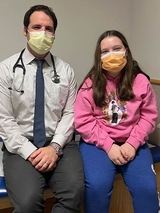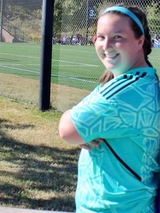Playing with Heart: Meghan’s Journey
Playing with Heart: Meghan’s Journey
In December 2020, 13-year-old Meghan tested positive for COVID-19. After the required period of quarantine, Meghan was seen by her Children’s Hospital of Philadelphia (CHOP) pediatrician. Due to the potential impact of COVID-19 on the heart — and Meghan’s commitment to year-round soccer — her pediatrician recommended a routine EKG prior to return to sports. The results of the EKG, however, were far from routine.

Meghan was sent for further testing, which revealed she had a heart condition: bicuspid aortic valve with significant ascending aortic dilation, and a leaky aortic valve. Bicuspid aortic valve (two aortic valve leaflets, instead of the normal three) is a common type of congenital heart disease, commonly associated with ascending aortic dilation — a weak spot in the aorta, which may cause the blood vessel wall to tear or break open.
“I was very concerned and very grateful her pediatrician sent us for the test,” says Meghan’s mom, Danielle. “This is a silent disease. We would’ve never known.”
Continuing to play competitive soccer could potentially place Meghan at risk of a life-threatening cardiac event. She was sidelined and referred to Jonathan B. Edelson, MD, Medical Director of CHOP’s new Sports Cardiology Clinic, which provides evaluation and individualized treatment plans for athletes with cardiac disease.
As goalie for a premier travel team, Meghan was crushed, especially when one of her friends had to fill her spot in the goal. “It really hurt to watch from the sidelines,” she says.
Getting back in the goal

Dr. Edelson conducted extensive imaging, including a cardiac MRI and a 24-hour Holter test. Meghan was then seen in CHOP’s Cardiovascular Exercise Physiology Laboratory — the largest of its kind in the country — for an exercise stress test to determine the impact of high levels of exertion on her heart. Because valve disease can be hereditary, Dr. Edelson also recommended precautionary echocardiograms for Danielle and Meghan’s older sister, Shannon, which fortunately showed no indication of heart disease.
After her case had been reviewed by CHOP’s expert pediatric cardiologists, Meghan was finally cleared to return to the sport she loves in early 2021.
A holistic approach

In the Sports Cardiology Clinic, Meghan learned that while soccer is OK, exercises that require bearing down, such as planks or push-ups, are off-limits, as they could further stretch her aorta. Instead, the team showed her safe ways to exercise and increase muscle.
Meghan also met with the clinic nutritionist and learned how to follow a heart healthy diet. “I try to eat more fruit, whole grains and healthier snacks,” she says.
Adds Danielle:
“Between the testing, the exercise lab and the nutritionist, the clinic takes a holistic approach to make sure that kids like Meghan can still play and be healthy.”
While Meghan’s thrilled to be back on the field, her CHOP team continues regular monitoring of her heart to ensure the dilation or leakiness doesn’t increase to the point that her activities become unsafe.
In the meantime, Meghan just celebrated her Sweet 16 and plans to pursue a future career as a sports analyst.